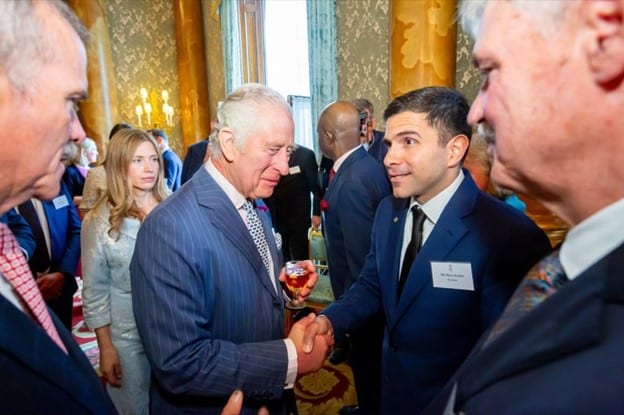Pioneering AI Computer Vision in Aerospace: Matroid Founder Engages with Global Leaders

Jeff Zeller | September 8th, 2023

During a recent visit to England, Reza Zadeh, the Founder and CEO of Matroid, had a unique opportunity to engage with global leaders and share the innovations pioneered by his company. At Buckingham Palace, His Majesty The King hosted a gathering that brought together astronauts, business leaders, environmental advocates, and scientific minds during a Space Sustainability Event. At the event, the King unveiled the Astra Carta seal, symbolizing a commitment to sustainable practices in the realm of space exploration.
“It was an honor to meet King Charles Ill at Buckingham Palace,” Zadeh said. “We spoke about Matroid deployments in aerospace factories. Very excited to help with the King’s Astra Carta on making space adventures more efficient and sustainable.”
The Royal website’s event summary explains that the Astra Carta seeks to unite the private sector in fostering and expediting sustainable measures within the global space industry. The initiative acknowledges space’s potential to shape a sustainable Earthly future and emphasizes the space industry’s responsibility in addressing ecological and sustainability consequences beyond our planet.
His Majesty’s dedication to a sustainable future spans more than five decades, underlining his conviction that every individual can have a positive impact in addressing even the most intricate global sustainability issues.
Redefining Possibilities: Matroid’s Advanced Approach
As the leading Industrial AI Computer Vision company in the world, Matroid works with premier industrial companies in aerospace, security, transportation and manufacturing as well as state and national governments. Matroid recently added the National Geospatial-Intelligence Agency (NGA), a combat support agency within the United States Department of Defense, as a customer, tasked with analyzing images from US government satellites to collect, analyze, and distribute geospatial intelligence (GEOINT) in support of national security.
Matroid is poised to be on the forefront of sustainable progress in the aerospace industry because of Zadeh’s extensive background in artificial intelligence. Unlike traditional rules-based approaches, Matroid harnesses the power of deep learning, a methodology which allows it to decipher complex patterns, classify defects, and analyze data with unparalleled accuracy.
Deep learning models are artificial neural networks (ANN) that are designed to simulate the behavior of the human brain’s interconnected neurons. These deep neural networks have demonstrated remarkable performance on a wide range of tasks, often outperforming traditional machine learning methods due to their ability to automatically learn intricate features and representations from raw data. Examples of deep learning architectures include Convolutional Neural Networks (CNNs) for image analysis, Recurrent Neural Networks (RNNs) for sequence data, and Transformer-based models for natural language processing.
The impact of Matroid’s computer vision on aerospace has been transformative. From automating visual inspections and detecting hazards to streamlining production processes, Matroid’s computer vision solutions offer Aerospace factories increased precision and enhanced efficiency. The technology also promotes better efficiency by validating proper assembly sequences and production zones.
The company’s end-to-end platform enables the remote visual inspection and classification of complex defects, incidents, actions, and events, regardless of the industry. Matroid’s philosophy hinges on the belief that if it can be seen, it can be detected – a testament to the company’s commitment to redefining the limits of AI computer vision.
Revolutionizing Space Exploration: Matroid’s Contribution to the King’s Astra Carta
The realm of space exploration has long been a frontier ripe with potential. Matroid’s advanced approach to computer vision, honed through collaboration with a diverse array of industries, holds tremendous promise for revolutionizing space travel.
Just as Matroid has streamlined production processes in aerospace factories, its ability to conduct visual inspections can also be harnessed to elevate the efficiency and sustainability of space travel.
One of the prime challenges in space exploration is the meticulous inspection of spacecraft components, requiring precision beyond measure. Matroid’s AI-powered computer vision can autonomously analyze intricate patterns in digital images, identifying potential defects or hazards that might otherwise escape human observation. By doing so, Matroid’s technology would enhance the safety of astronauts and space travelers but also contribute to the longevity of spacecraft, aligning with the sustainability ethos of the Astra Carta.
Moreover, Matroid’s platform holds the potential to optimize various aspects of space missions. From real-time monitoring of equipment performance to swift object detection of anomalies that might arise during the journey, the application of Matroid’s technology can significantly reduce the margin of error. This, in turn, minimizes resource wastage and maximizes the chances of successful mission outcomes, embodying the core principles of efficiency and sustainability.
Whether it’s providing visual data, identifying potential equipment malfunctions, assessing the health of astronauts, or evaluating the environmental impact of a mission, Matroid’s technology can provide a comprehensive perspective that informs strategic decision-making.
As Matroid continues to redefine the limits of what AI can achieve, the possibilities for reshaping the future of space exploration become all the more compelling.
Download Our Free
Step By Step Guide
Building Custom Computer Vision Models with Matroid
Dive into the world of personalized computer vision models with Matroid's comprehensive guide – click to download today